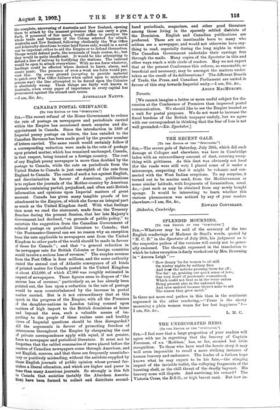CANADA'S POSTAL GRIEVANCE.
[To THE EDITOR OP THE u.SPEOTATOR.")
Sin,—The recent refusal of the Home Government to reduce the rate of postage on newspapers and periodicals carried within the Empire has occasioned much surprise and dis- appointment in Canada. Since the introduction in 1899 of Imperial penny postage on letters, the loss entailed to the Canadian Revenue has been made good by the greater number of letters carried. The same result would certainly follow if a corresponding reduction were made in the rate of postage upon printed matter, which has remained unchanged, Canada, in that respect, being treated as a foreign country. The cost of any English penny newspaper is more than doubled by the postage to Canada, while the rate on periodicals from the United States to Canada is just one-eighth of the rate from England to Canada. The result of such a tax against English, and discrimination in favour of American, publications is to replace the journals of the Mother-country by American journals containing partial, prejudiced, and often anti-British information and opinions upon Imperial matters of great moment. Canada has given many tangible proofs of her attachment to the Empire, of which she forms an integral part as much as the United Kingdom itself. With what feelings then must we read the statement, made from the Treasury Benches during the present Session, that her late Majesty's Government had declined, "on grounds of public policy," to entertain the suggestion from the Canadian Government of reduced postage on periodical literature to Canada; that "the Postmaster-General can see no reason why an exception from the rate applicable to newspapers sent from the United Kingdom to other parts of the world should be made in favour of those for Canada" ; and that "a general reduction in the newspaper rate for British Colonies or foreign countries would involve a serious loss of revenue." The surplus revenue From the Post Office is four millions, and the same authority dated the annual cost of Atlantic conveyance of all kinds of printed matter for Canada posted in the United Kingdom at about 212,000, of which 27,000 was roughly estimated in respect of newspapers. These figures seem to dispose of "the aerious loss of revenue," particularly as, SS has already been pointed out, the loss upon a reduction in the rate of postage would be soon counterbalanced by the increase in postal matter carried. But is it not extraordinary that at this ?pooh in the progress of the Empire, with all the Premiers the daughter-nations in London taking counsel upon matters of high import to the British dominions at home and beyond the seas, such a valuable means of im- Parting to the people of these realms sane and healthy views of Imperial questions should be thus disregarded ? All the arguments in favour of promoting freedom of intercourse throughout the Empire by cheapening the cost of private correspondence apply with equal, if not greater, force to newspaper and periodical literature. It must not be forgotten that the cabled summaries of news placed before the readers of Canadian newspapers come through American, and not English, sources, and that these are frequently unsatisfac- tory or positively misleading, without the antidote supplied by those English journals of public opinion whose perusal fur- nishes a liberal education, and which are higher and purer in tone than many American journals. So strongly is this felt ni Canada that societies (notably the Aberdeen Associa- tion) have been formed to collect and distribute second- hand periodicals, magazines, and other good literature among those living in the sparsely settled districts of the Dominion. English and Canadian publications are preferred. These are an inestimable boon to many who seldom see a newspaper, and would not otherwise have any- thing to read, especially during the long nights in winter. The Canadian Government undertake their carriage free through the mails. Many copies of the Spectator in this and other ways reach a wide circle of readers. May we not expect that at the present Conference this reform, so reasonable, so beneficial and necessary, may be amongst the matters under- taken as the result of its deliberations ? The different Boards of Trade, the Press, and Canadian Parliament are united in favour of this step towards Imperial unity.—I am, Sir, &c.,
Toronto.
ANGUS MAcMuncErr.
[We cannot imagine a better or more useful subject for dis- cussion at the Conference of Premiere than improved postal communication. We should like to see the Empire treated as a unit for postal purposes. We do not want to increase the fiscal burdens of the British taxpayer unduly, but we agree with our correspondent in thinking that the fear of loss is not well grounded.—ED. Spectator.]






































 Previous page
Previous page